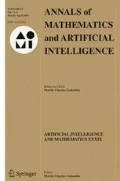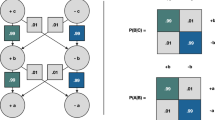Abstract
The lexicographic closure of any given finite setD of normal defaults is defined. A conditional assertiona ❘∼b is in this lexicographic closure if, given the defaultsD and the facta, one would concludeb. The lexicographic closure is essentially a rational extension ofD, and of its rational closure, defined in a previous paper. It provides a logic of normal defaults that is different from the one proposed by R. Reiter and that is rich enough not to require the consideration of non-normal defaults. A large number of examples are provided to show that the lexicographic closure corresponds to the basic intuitions behind Reiter's logic of defaults.
Similar content being viewed by others
References
S. Benferhat, C. Cayrol, D. Dubois, J. Lang and H. Prade, Inconsistency management and prioritized syntax-based entailment, in:Proc. 13th IJCAI, Chambéry, Savoie, France, ed. R. Bajcsy (Morgan Kaufmann, 1993) pp. 640–645.
C. Cayrol and M.C. Lagasquie-Schiex, Comparison de relations d'inférence non monotone: Étude de complexité, Technical Report 93.23.R, Institut de Recherche en Informatique de Toulouse (1993).
M. Freund, D. Lehmann and P.H. Morris, Rationality, transitivity, and contraposition, Artificial Intelligence 52(1991)191–203. Research Note.
M.L. Ginsberg, Counterfactuals, Artificial Intelligence 30(1986)35–79.
M.L. Ginsberg,Readings in Nonmonotonic Reasoning (Morgan Kaufmann, Los Altos, CA, 1987) Chap. 1, pp. 1–23.
M. Goldszmidt, P.H. Morris and J. Pearl, A maximum entropy approach to nonmonotonic reasoning,Proc. AAAI-90, Boston (1990).
M. Goldszmidt, P.H. Morris and J. Pearl, A maximum entropy approach to nonmonotonic reasoning, IEEE Trans. Pattern Anal. and Machine Intellig., to appear.
S. Kraus, D. Lehmann and M. Magidor, Nonmonotonic reasoning, preferential models and cumulative logics, Artificial Intelligence 44(1990)167–207.
M.C. Lagasquie-Schiex, private communication (1993).
D. Lehmann, What does a conditional knowledge base entail? in:Proc. 1st Int. Conf. on Principles of Knowledge Representation and Reasoning, Toronto, Canada, eds. R. Brachman and H. Levesque (Morgan Kaufmann, 1989).
D. Lehmann, Another perspective on default reasoning, Technical Report TR-92-12, The Leibniz Center for Computer Science, Institute of Computer Science, Hebrew University, Jerusalem (1992). Presented at theBar-Ilan Symp. on Foundations of AI (1993).
D. Lehmann and M. Magidor, What does a conditional knowledge base entail? Artificial Intelligence 55(1992)1–60.
D. Makinson, General patterns in nonmonotonic reasoning, in:Handbook of Logic in Artificial Intelligence and Logic Programming, Vol. 2:Nonmonotonic and Uncertain Reasoning, eds. D.M. Gabbay, C.J. Hogger and J.A. Robinson (Oxford University Press, 1993).
B. Nebel, Belief revision and default reasoning: Syntax-based approaches, in:Proc. 2nd Int. Conf. on Principles of Knowledge Representation and Reasoning, eds. J. Allen, R. Fikes and E. Sandewall (Morgan Kaufmann, 1991) pp. 417–428.
D. Poole, A logical framework for default reasoning, Artificial Intelligence 36(1988)27–47.
R. Reiter, A logic for default reasoning, Artificial Intelligence 13(1980)81–132.
R. Reiter and G. Criscuolo, Some representational issues in default reasoning, Int. J. Comp. Math. Appl. 9(1983)15–27.
R.C. Stalnaker, What is a nonmonotonic consequence relation?4th Int. Workshop on Nonmonotonic Reasoning, Plymouth, Vermont (1992).
Author information
Authors and Affiliations
Additional information
This work was partially supported by the Jean and Helene Alfassa fund for research in artificial intelligence.
Rights and permissions
About this article
Cite this article
Lehmann, D. Another perspective on default reasoning. Ann Math Artif Intell 15, 61–82 (1995). https://doi.org/10.1007/BF01535841
Issue Date:
DOI: https://doi.org/10.1007/BF01535841



